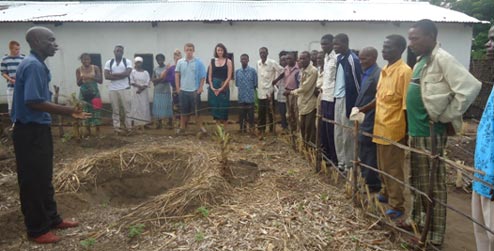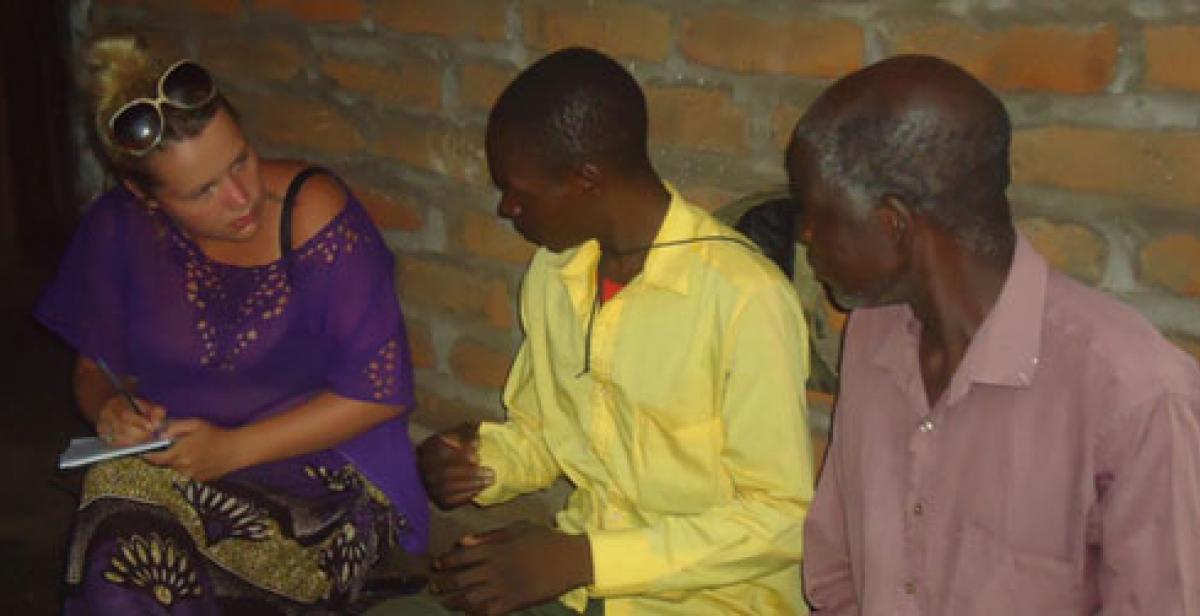We finally have lift off! After all the preparation and planning the practical work has finally begun. And things have moved so fast,we have had so much help and support from the locals and farmers that many hands have made light work.
This week we have focused on water flow and direction, so we have been creating pit beds. Pit beds are small holes in the ground about 45cm deep and 55cm wide that catch surface run off water. Around them we will be planting a variety of fruit and veg.
This method enables people to have maximum benefits from their water supply, while reducing soil erosion. And when the plants grow the roots will stabilise the ground and the plants will provide organic food to the people. We just hope that we are able to have enough fruit and veg to plant for all our pit beds!
Limited resources
In our free time some of us are also teaching English at one of the local schools. This is rewarding and enjoyable as we are able to communicate well with the students and learn from them, about their culture and hopes and dreams for the future.
Unfortunately the school has limited resources, not enough textbooks for each student, no mosquito screens on the windows, no electricity except for a small solar panel that is only able to power one plug. So this is something the group will focus on getting resources for when we are back in the UK.
Food security
Providing resources seems to be the main concern for most Malawians we have met. They really feel powerless to be able to provide for themselves. This is understandable: the average household income is less than a dollar a day, so they are constantly battling to survive.
We hope that permaculture will enable them to have more power over their resources and food and have better security for the future. The key point of this process is to give people the skills they need in order to change and to help them see that an alternative method of farming can be more productive, cheaper to manage and less work.
But people are afraid to change their usual farming systems, because if their harvest fails then they are left with nothing, no food to feed their children and no way of making income. Their situation is very serious and we as volunteers can understand their apprehension towards the project.

21 chiefs
As our time here is so limited, we have decided to focus more intensely on one site, so that when we leave, the locals can see that permaculture can be a successful alternative way to farm, and feel more confident about making changes to their own land.
This week we also arranged a meeting with 21 chiefs from the local area. We met them in one of the schools we are working on and discussed why we are here, what their concerns were about the project and what they hope we can all achieve together. They were positive and open about the project and now each chief is able to explain to his/her village about the permaculture projects taking place.
Party time
On a more personal note one of the boys in our group was 22 years old this week! So we had a surprise party for him Malawian style. We managed to get hold of a battery and a sound system from the nearest town and we had music – very loud music – to dance to.
About 200 people turned up to the party: the whole village! This was an excellent time to network with the local people and for them to be free to ask us questions in an informal setting. It was amazing: everyone danced with us and we felt closer to the community and Malawian culture. It was a traditional experience none of us will ever forget.
By ICS Progressio volunteer Katie Boocock.Photos: (top) Susan Teale interviewing the head chief of the Nsanje district; (bottom) the group and Jamestar (the director of the school) presenting and explaining our work to the 21 chiefs of Nsanje.



